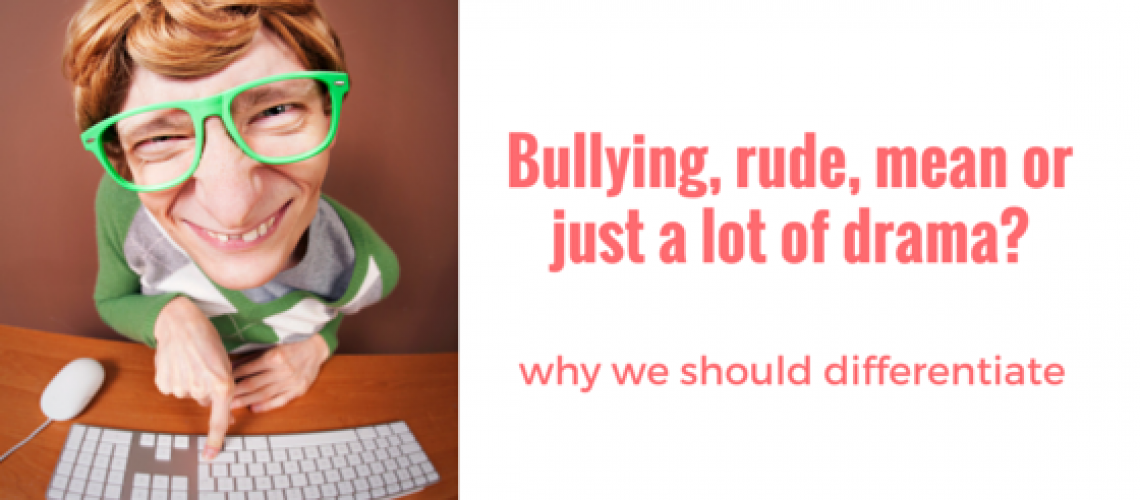One of the most frustrating things about the attention bullying gets today is the unfortunate overuse of the word. I will say from the get go, that bullying behaviour needs attention. It is hurtful, dangerous and oftentimes has catastrophic consequences. It needs attention and it needs to stop.
Sometimes what people experience either in real life or online however, is labelled bullying, but really it is not. It is people being mean, not thinking things through, being nasty, bitchy, narcissistic, jealous or just thriving in a whole world of drama.
Why do we need to differentiate? Because bullying need to be dealt with differently. Whilst all these behaviours may be hurtful, we do need to be careful we don’t become nonchalant to the impact and effect of bullying.
So what are some of the behaviours that we need to differentiate?
Being Rude
Being rude involves comments made that are not necessarily vindictive by intent, but come across that way through either boldness, misunderstanding or just thoughtlessness. Sometimes they are just a little arrogant in their beliefs, or lacking a certain amount of empathy.
It may be a comment such as “Have you ever thought of cutting your hair?” It may also be someone pushing ahead in a queue. Grabbing the last 2 chocolate biscuits so no one else can. Or it could be burping in someone’s face.
It’s often one off comments, or maybe its just a personality trait that lacks a few social skills and etiquette. Usually it’s spontaneous and unplanned. Yes it’s rude, yes it can be hurtful, yes the behaviour should be brought to attention, but it’s not bullying.
Being mean
This is much more purposeful in its intent but generally only something that happens once or twice. The aim is to cause hurt and criticise. It could be a comment on appearance, clothing, skill level, intelligence or anything really. It is often with the purpose of making oneself look better or cooler or smarter. It may also be done out of anger or jealousy or may be the result of a lack of understanding of how to deal with negative emotions. It could be comments like “I can’t believe you came last in the race again. You must be so slow”, or “That dress is so last season, you really need to update your wardrobe”. So yes it can be hurtful. Horrible in fact. But it doesn’t necessarily mean we label this behaviour bullying.
Creating drama
Some people actually thrive on drama don’t they? They love making mountains out of molehills, or exaggerating situations and circumstance to keep the conversation and often unnecessary antics lingering on.
We see this increasingly with the take up of social media as one of our most prolific ways to interact. Often kids have mentioned to me about the “drama” of certain apps or sites or people. Those places many avoid because of the ‘dramas’ but many are also drawn to for the very same reason.
An example: a friend had a daughter on Instagram. Let’s call her Jane. Jane’s friend Sally posted a photo of Jane and Sally at a party with the caption ‘Best Friend For Ever’ (or probably BFF). Jane didn’t go on Instagram that night or check her ipod. She had a family dinner. Sally took Jane’s neglect to ‘like’ or ‘comment’ on said photo as a slight on their friendship. She didn’t speak to Sally the next day. Sally didn’t know why. Everyone started talking about the ‘fight’, some taking sides and some making further comments on the picture. Just a whole lot of drama really, about really not a lot. Annoying, sometimes intentional, sometimes hurtful, sometimes just miscommunication, but certainly not bullying.
So what is bullying?
We usually say that bullying involves 3 key elements:
- It is a power imbalance
- It is aggressive behaviour repeated over time
- It is done with the intent to cause harm.
It can involve physical aggression and violence, verbal threats and taunts and relational aggression, such as threatening to take away friends, socially exclude or spread rumours. We know also that cyberbullying can take on different forms such as defamation, stalking, impersonating or spreading of images or video with the intent to cause embarrassment or humiliation.
Why should we make the distinction?
We should make the distinction because recently in one of my talks somebody said “Isn’t every kid bullied these days? In our day it was ‘sticks and stones’ and we just got on with life”. Now there are obviously a number of concerns with this type of thinking, but none more glaring than the fact that “names” can and have hurt and will continue to hurt a good many people.
Aside from that, we don’t want to ever diminish the hurt that people who are truly bullied feel, when so many others can more easily ‘get over’ a few rude and mean comments.
We do need to know when to pay real attention. When need to know when and how to intervene. We also need to be aware of the legal implications of bullying and when and how we may need the law to intervene.
Whilst all these behaviours can cause hurt and embarrassment, we must be wary of the labels we use, and the language we should be using, in order to help us better address the devastating consequences of bullying.


This Post Has 4 Comments
Oh I was just talking about this with a friend the other day! Spot on!
Pingback: Bullying, rude, mean or just a lot of drama? Why we should differentiate - e-Learning Feeds
Pingback: Bullying : Facts and myths
Pingback: Dealing with bullying: parents questions answered - The Modern Parent
Comments are closed.